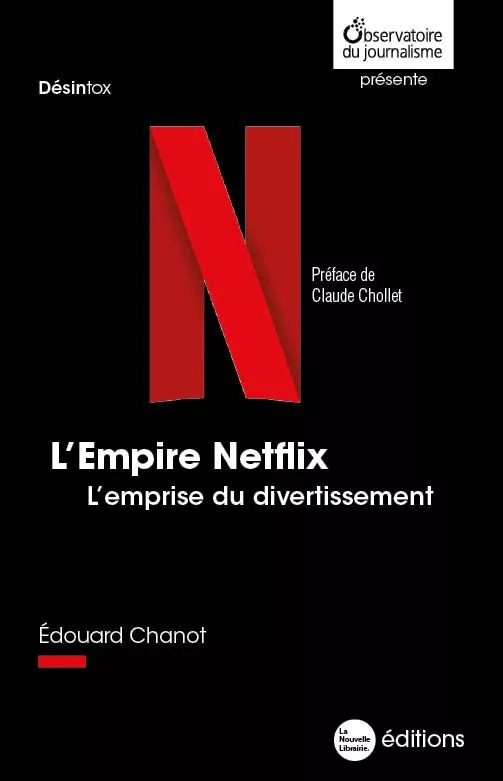
The Californian video-on-demand company Netflix has accomplished the feat of providing globalized television entertainment for several billion people. The figures speak for themselves: 1 billion cumulative hours of viewing per week worldwide in 2018; 221 million subscribers in 2022. Through Netflix, almost no one connected to the web escapes the injunction for compulsory entertainment.
It is this empire of amusement that the French essayist Édouard Chanot analyzes in his latest opus, L’Empire Netflix, l’emprise du divertissement, recently published by La Nouvelle Librairie. As Claude Chollet, director of the collection Désintox (Detox) to which this book belongs, reminds us, the danger represented by Netflix is twofold: that of the content of the ideology conveyed, and that of the monopoly situation created by the channel.
The Netflix channel has greatly contributed to changing our relationship to television entertainment by offering content available, via smartphone or tablet, all the time, everywhere, and continuously. But the illusion of choice, maintained by the seemingly unlimited ability for the viewer to ‘choose’ the program that suits him, masks a skillfully orchestrated control of content that’s been ideologically selected for its ability to shape imaginations and ‘make representations evolve.’
Édouard Chanot reminds us that Netflix, like so many other tech companies—Google first and foremost—has a ‘cool’ and benign image, behind which reigns a ruthless management, favoring humiliation of its staff as a ‘best business’ practice, a method readily forgotten thanks to sky-high salaries. The Netflix company is an example of the ultimate expression of a morality-free capitalism that claims to be ‘transparent’ but crushes employees without mercy. Like Meta (ex-Facebook), like Google, the directors of Netflix are kings of the algorithm, probing our slightest desires with clicks and scrolls in order to offer us a universe that resembles us, thus creating an addiction, and locking us in.
Today, Netflix is suffering and losing subscribers—especially to its competitors, Disney+ and Amazon Prime. From the inner workings of the company to its manipulation of viewers, there is nothing innocent about the company, and it appears that its hand in cultural formation has been revealed, and found wanting. Elon Musk has put into words what everyone else is thinking: eaten away by the virus of wokism, the video-on-demand platform Netflix has become unwatchable. The ‘strong woman’ profiles, the improbable life situations featuring intersectional heroes coming from oppressed, racialized, and LGBT minorities have invaded entertainment choices to the point of tiring viewers and undermining one of the keys to Netflix’s success: flattering the customer’s instincts and offering them what they want.
Yet, despite its apparent backflow, Netflix’s relentless labor of cultural formatting, even faced with a certain loss of steam, has obviously borne fruit among a generation of youth that now confuses the world depicted by Netflix with real life. What should apparently make us conservatives happy (the loss of subscribers) may nevertheless give us more reason to be vigilant: the model of progressive cultural activism that Netflix embodies fights forward—engaging in the permanent revolution borrowed from the communists—at the expense of sometimes colossal losses, which will eventually be overcome. Netflix may be willing to lose the battle so that the greater war can be won.
On reading Chanot’s essay, which brings together in a dense and efficient way observations that are certainly already known to many, an obvious reflection comes to mind. How many people, even in conservative circles, have given in to the sirens of Netflix because, by looking hard enough, they were able to find well-made series that ‘corresponded’ to them? How many families offer their children a subscription, which seems to have become an inevitable piece of the apparatus of daily life?
Nothing seems wrong with a discerning use of Netflix. Indeed, we can occasionally find good materials to watch. But the company’s final goals are anything but harmless, Chanot wishes to remind the innocent subscriber, and demands the exercise of moral courage. If education is about making choices, getting rid of Netflix seems like a good one, for we can not be satisfied with supporting—with our time or money—a media that is bound to destroy the virtues we care to preserve within our families.